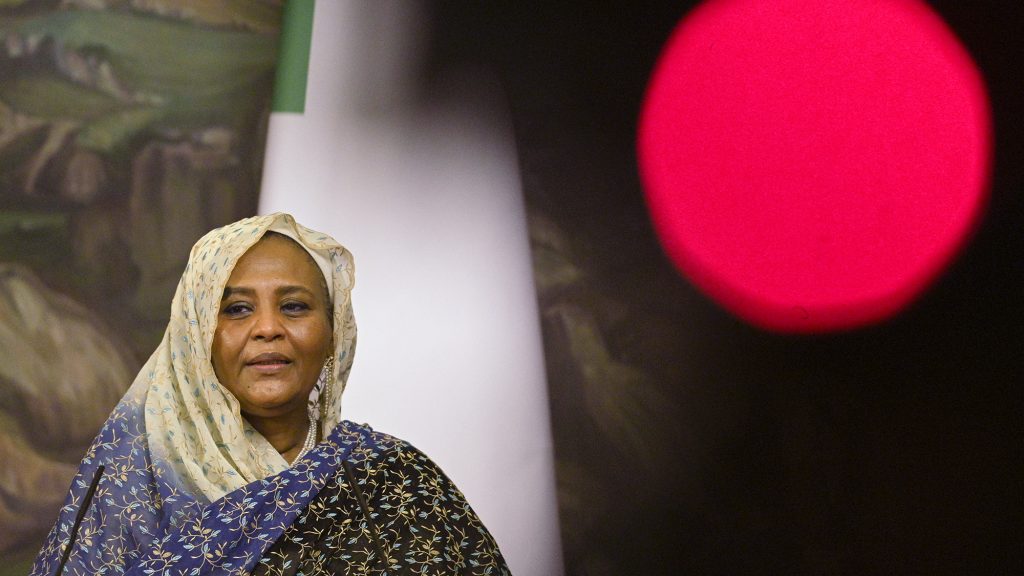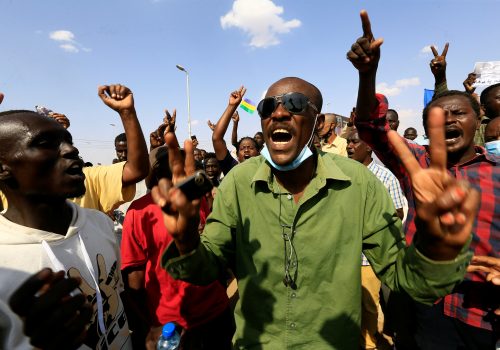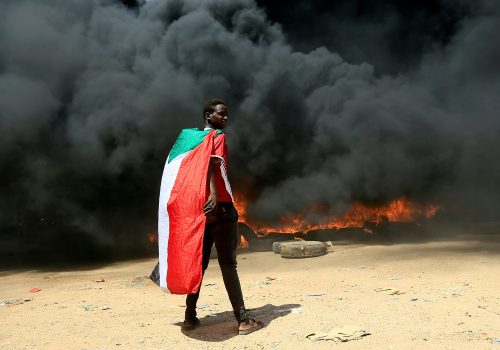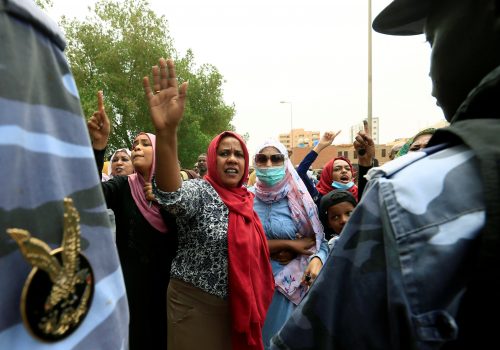The Sudanese military’s reinstallation of Prime Minister Abdalla Hamdok “seems to have shaken the picture,” and for some people, the situation may be “a little more hazy” than it was since the October coup, said former Minister of Foreign Affairs Mariam al-Mahdi. Despite that uncertainty, al-Madhi warned that the political agreement signed Sunday by Hamdok and Sudan’s top general “was more supportive to the coup” than the pro-democracy movement.
Al-Mahdi dissected the evolving political crisis in her country at an event hosted by the Atlantic Council’s Africa Center on Monday. She said she heard the news of the agreement on television before meeting with Hamdok and other members of his cabinet Monday to express her surprise and disagreement. In the end, all except five of the ministers who attended the meeting submitted their resignations, al-Madhi told the Atlantic Council.
In doing so, they reminded Hamdok that “the democratic transition is inevitable,” Mahdi recounted.
Kholood Khair, managing partner of Khartoum-based think tank Insight Strategy Partners, and Mohanad Hashim, former director of content for Sudan’s national radio and TV broadcaster, also joined in to share their perspectives on how Sudan’s protest movement is reacting to the recent developments, as well as to offer advice on how the United States and western allies can better support the pro-democracy movement.
Below are more highlights from the event, which was moderated by Africa Center nonresident senior fellow Cameron Hudson, including an update on pro-democracy protests and al-Mahdi’s message to international supporters.
The road to democracy
- Sunday’s agreement “didn’t take into consideration” serious developments on the ground in Sudan, such as the escalation of violence by authorities at street protests, said al-Mahdi. On November 17, for example, security forces killed at least fifteen people. She added that the agreement marked a “setback in trust” specifically from Sudanese youth—who are driving the pro-democracy movement and now have more trust in the Forces of Freedom and Change (FFC) political coalition, which refused to recognize the deal.
- Khair added that the “agreement itself is not that significant” because it “doesn’t really mention the ‘how’s’ or the timeframes” for the promised political transition, making it “difficult to implement.”
- Khair, meanwhile, explained that although the agreement met the international community’s demands, the street protesters were left unsatisfied. “The deal itself is kind of unstable,” she said. “The international community needs to get behind the street or get out of its way.”
- Hashim added that the base which provided the prime minister legitimacy “has just walked away” from him because of the deal. “They view that this… is a continuation” of the prior 2019 coup. “Hamdok might have miscalculated this big time,” he said.
Call for back-up
- Al-Mahdi said international support for the people of Sudan is “overwhelming,” particularly because partners were “well-prepared by the first coup attempt” in September. Even countries she suspected “wanted to support the coup”—such as Egypt and Israel—didn’t do so outwardly.
- The White House and US Congress seemed united in “one line in support of the revolution of Sudan and the transition,” al-Mahdi said, praising the United States for its support. That support, she said, went beyond mere words and extended to key meetings between US Special Envoy for the Horn of Africa Jeffrey Feltman and Sudanese leaders.
- Hashim argued that US support “seemingly is cautious, perhaps even timid,” pointing to the fact that US Secretary of State Antony Blinken was in the region last week but didn’t visit. “There hasn’t been a clear US policy for Sudan,” he said.
- But “we need for the United States to continue with us,” al-Mahdi urged, and the United States must tell the military—“while not frightening them”—that it “cannot mess with political parties” because it would pose a “serious threat to democratic transformation” in Sudan.
What’s to come
- Al-Mahdi explained that the coup “was not really, in essence, a surprise” and that she had a sense it could take place “at any moment since the early months of 2020.” But it was still a crime: “All the violators should be put into jail and…condemned,” she said.
- In order to secure this transition period, the FFC should work with the military to clarify its role to protect the state and constitution and at the same time “stop the killing in the street.” And after the first post-coup election, it’ll be important for “everyone to go and abide by their role as agreed [upon] by everybody” to build a strong state and continue Sudan’s democratic transition, al-Mahdi said.
Katherine Walla is the assistant director of editorial at the Atlantic Council.
Further reading
Fri, Oct 29, 2021
Sudan’s coup wasn’t a failure of US diplomacy. It was the dawn of a new era in Africa.
New Atlanticist By
In a context where Washington’s voice is diluted amid competing powers vying for influence in Africa, Sudan has emerged as the ultimate battleground.
Mon, Oct 25, 2021
FAST THINKING: What’s behind the coup in Sudan?
Fast Thinking By
What’s next for Sudan and the global partners in its state-building project? Our experts weigh in.
Fri, Oct 1, 2021
Sudan’s failed coup shows why military reform is a must
AfricaSource By
Sudan’s civilian leaders are facing off with the country's powerful military.
Image: Sudan's Foreign Minister Mariam Al-Sadiq Al-Mahdi gives a press conference following a meeting with Russia's Foreign Minister Sergei Lavrov at the Russian Foreign Ministry's Reception House in Spiridonovka Street. Photo via Ramil Sitdikov/Reuters.



